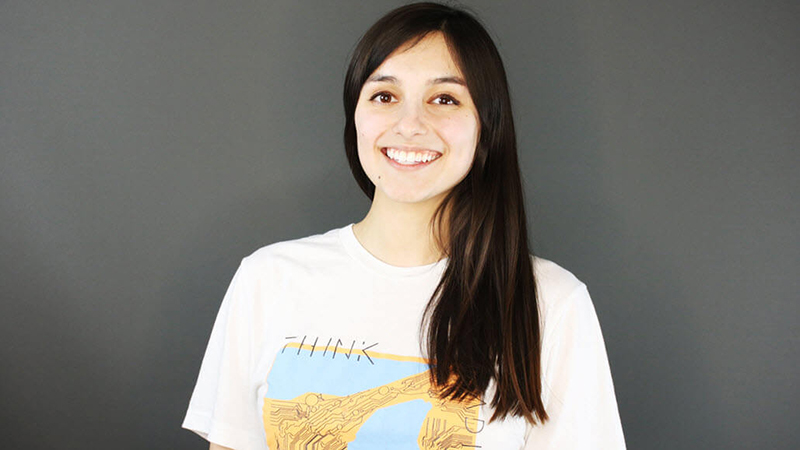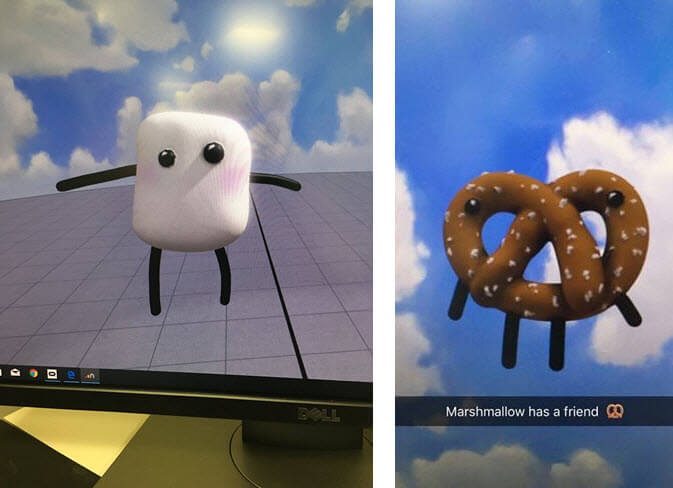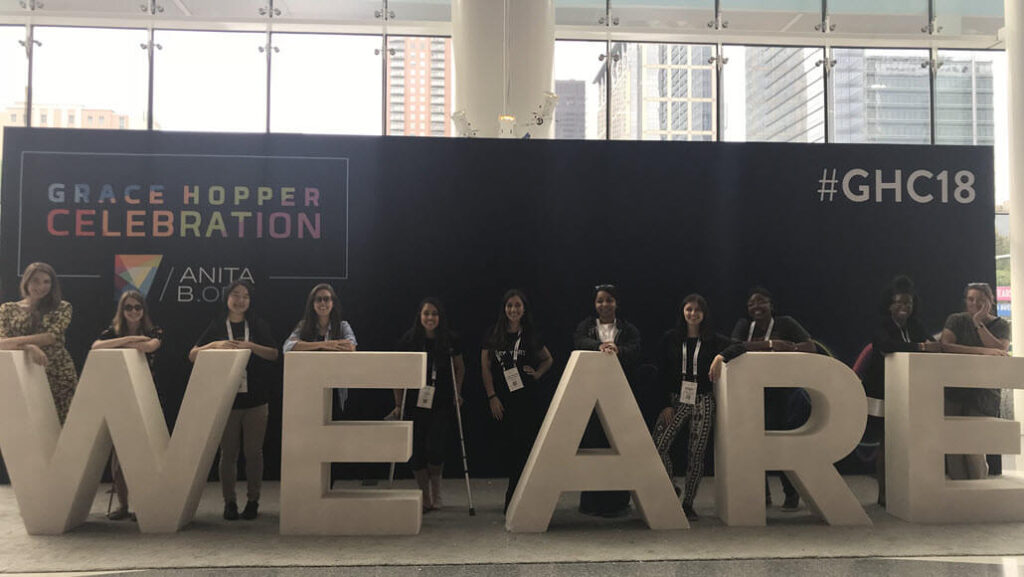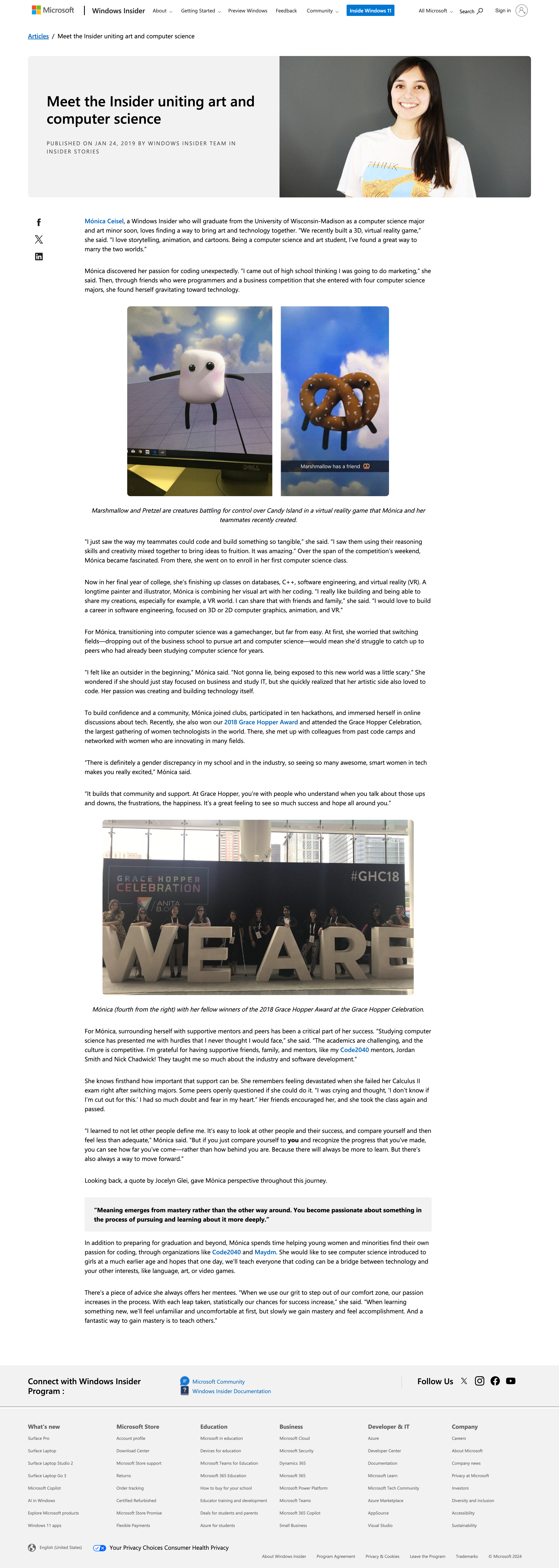Windows Insider article published on Jan 24, 2019

Mónica Ceisel, a Windows Insider who will graduate from the University of Wisconsin-Madison as a computer science major and art minor soon, loves finding a way to bring art and technology together. “We recently built a 3D, virtual reality game,” she said. “I love storytelling, animation, and cartoons. Being a computer science and art student, I’ve found a great way to marry the two worlds.”
Mónica discovered her passion for coding unexpectedly. “I came out of high school thinking I was going to do marketing,” she said. Then, through friends who were programmers and a business competition that she entered with four computer science majors, she found herself gravitating toward technology.

“I just saw the way my teammates could code and build something so tangible,” she said. “I saw them using their reasoning skills and creativity mixed together to bring ideas to fruition. It was amazing.” Over the span of the competition’s weekend, Mónica became fascinated. From there, she went on to enroll in her first computer science class.
Now in her final year of college, she’s finishing up classes on databases, C++, software engineering, and virtual reality (VR). A longtime painter and illustrator, Mónica is combining her visual art with her coding. “I really like building and being able to share my creations, especially for example, a VR world. I can share that with friends and family,” she said. “I would love to build a career in software engineering, focused on 3D or 2D computer graphics, animation, and VR.”
For Mónica, transitioning into computer science was a gamechanger, but far from easy. At first, she worried that switching fields—dropping out of the business school to pursue art and computer science—would mean she’d struggle to catch up to peers who had already been studying computer science for years.
“I felt like an outsider in the beginning,” Mónica said. “Not gonna lie, being exposed to this new world was a little scary.” She wondered if she should just stay focused on business and study IT, but she quickly realized that her artistic side also loved to code. Her passion was creating and building technology itself.
To build confidence and a community, Mónica joined clubs, participated in ten hackathons, and immersed herself in online discussions about tech. Recently, she also won our 2018 Grace Hopper Award and attended the Grace Hopper Celebration, the largest gathering of women technologists in the world. There, she met up with colleagues from past code camps and networked with women who are innovating in many fields.
“There is definitely a gender discrepancy in my school and in the industry, so seeing so many awesome, smart women in tech makes you really excited,” Mónica said.
“It builds that community and support. At Grace Hopper, you’re with people who understand when you talk about those ups and downs, the frustrations, the happiness. It’s a great feeling to see so much success and hope all around you.”

For Mónica, surrounding herself with supportive mentors and peers has been a critical part of her success. “Studying computer science has presented me with hurdles that I never thought I would face,” she said. “The academics are challenging, and the culture is competitive. I’m grateful for having supportive friends, family, and mentors, like my Code2040 mentors, Jordan Smith and Nick Chadwick! They taught me so much about the industry and software development.”
She knows firsthand how important that support can be. She remembers feeling devastated when she failed her Calculus II exam right after switching majors. Some peers openly questioned if she could do it. “I was crying and thought, ‘I don’t know if I’m cut out for this.’ I had so much doubt and fear in my heart.” Her friends encouraged her, and she took the class again and passed.
“I learned to not let other people define me. It’s easy to look at other people and their success, and compare yourself and then feel less than adequate,” Mónica said. “But if you just compare yourself to you and recognize the progress that you’ve made, you can see how far you’ve come—rather than how behind you are. Because there will always be more to learn. But there’s also always a way to move forward.”
Looking back, a quote by Jocelyn Glei, gave Mónica perspective throughout this journey.
“Meaning emerges from mastery rather than the other way around. You become passionate about something in the process of pursuing and learning about it more deeply.”
In addition to preparing for graduation and beyond, Mónica spends time helping young women and minorities find their own passion for coding, through organizations like Code2040 and Maydm. She would like to see computer science introduced to girls at a much earlier age and hopes that one day, we’ll teach everyone that coding can be a bridge between technology and your other interests, like language, art, or video games.
There’s a piece of advice she always offers her mentees. “When we use our grit to step out of our comfort zone, our passion increases in the process. With each leap taken, statistically our chances for success increase,” she said. “When learning something new, we’ll feel unfamiliar and uncomfortable at first, but slowly we gain mastery and feel accomplishment. And a fantastic way to gain mastery is to teach others.”
Original full design:

